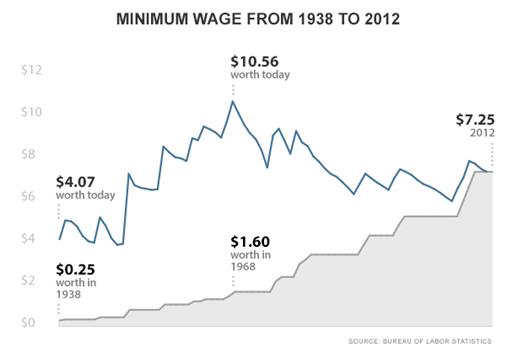A Gallup poll conducted in January found that 67% of Americans are dissatisfied with the income distribution in our country. And the problem seems to be worsening. A recent report from Oxfam shows that, since the financial crisis in 2009, the wealthiest one percent in the US have captured 95% of financial growth, while the bottom 90% of the population have only become poorer.
So what can we do to combat income inequality?
 There is no one solution that will solve the problem. But, one way to help is allowing all workers to earn a living wage. As we discuss what a reasonable minimum wage, or living wage is, it’s important to take a look the buying power of the minimum wage over time.
There is no one solution that will solve the problem. But, one way to help is allowing all workers to earn a living wage. As we discuss what a reasonable minimum wage, or living wage is, it’s important to take a look the buying power of the minimum wage over time.
Raw numbers don’t tell the story, because inflation doesn’t let you compare apples to apples. Here’s a chart that shows the buying power of the minimum wage over the years vs. the raw number. Somebody making $1.60 an hour in 1968 had the same buying power as a person getting $10.56 in 2012.
Across the nation and specifically in Washington state many people want to raise the minimum wage.
Last week, Rep. Jessyn Farrell introduced a bill, HB 2672, that will increase the state minimum wage to $12 by 2017. Currently, the state’s minimum wage is $9.32/hour.
The main argument against raising minimum wage is simple: “businesses will move to where wages are lower.”
However, history has proved this argument wrong. Citizens in Washington state passed initiative 688 in 1998 to automatically raise the minimum wage as inflation went up. For years, we had the nation’s highest minimum wage. The mass exodus of businesses didn’t happen. Washington is an economic bright spot.
In addition to the $12 minimum wage bill, efforts to increase the minimum wage are coming from all over:
- This last November, voters in Sea-Tac approved Prop 1, an initiative on the ballot that requires a $15 minimum wage.
- Governor Inslee recently called for a raise the minimum wage in his State of the State address.
- Ed Murray, Mayor of Seattle and the Seattle City Council are also fighting for a $15/hour minimum wage.
Increasing the minimum wage will not solve income inequality in our state. But, it also won’t drive away all small businesses.
There’s no question, however, an increase will help working moms and dads afford groceries, childcare and transportation.
